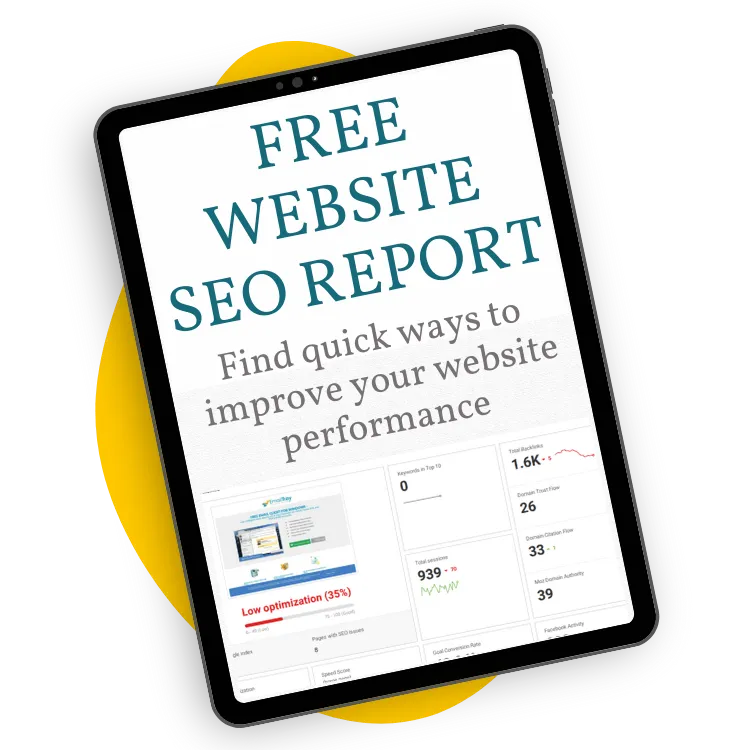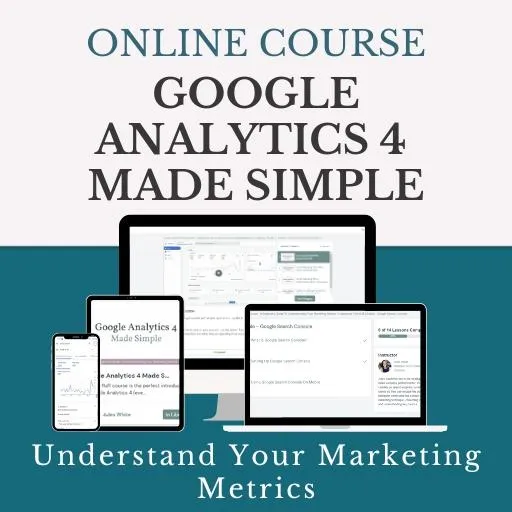How to Use Google Search Console to Improve SEO: A Beginner's Guide
By Jules White | Published: September 30th 2024 | reading time: 7 minutes

🎙️Listen to the podcast version of this article🎙️
My Favourite Free Google Tool!
Hidden within Google's toolbox lies a secret weapon for website success. It's free, powerful, and often overlooked. Unlock the potential of Google Search Console and transform your website from a hidden gem to a traffic magnet.
If you’ve ever wondered how to get more traffic to your website, Google Search Console is one of the first tools I recommend setting up.
It’s a tool I use almost every day in my business because it helps me see how Google views my site and provides data I can use to improve your SEO.
Table of Contents:
Introduction to Google Search Console
How Search Works: A Quick Recap
Google Search Console vs Google Analytics
Setting Up Google Search Console
Using Google Search Console To Improve Your Website
- The Insights Panel: A User-Friendly Overview
- Diving Deeper: Reports and Metrics
Optimising for SEO with Google Search Console
Troubleshooting Technical Issues
Submitting Pages to Google
Introduction to Google Search Console
Google Search Console is massively undervalued, in my opinion. People often overlook just how helpful it can be. If you’re serious about growing your website and attracting more traffic, this is one of the first tools I recommend setting up.
Not only does it help you understand what’s happening behind the scenes, but it also allows you to make decisions based on real data. Whether it’s spotting errors, finding out what search terms people are using to find your site, or seeing how you rank in Google—this tool is a must-have.
How Search Works: A Quick Recap
Before we dive into the tool itself, it helps to understand how Google works. Think of Google as a massive library. Its job is to scan the web and index millions of websites, categorising them based on the content they contain.
Google’s robots, also called crawlers, go through your website and make decisions about what your pages are about and how relevant they are to specific search terms.
The better Google understands your content, the more likely it is to show up in search results.
Google Search Console provides valuable data that helps you understand how Google perceives your website. This information allows you to make informed decisions about your content and website structure, ultimately improving your search engine rankings.
Google Search Console vs Google Analytics
It’s easy to confuse Google Search Console with Google Analytics. Both are powerful tools, essential for website success, but they do very different things.
👀 Google Analytics tracks what people do once they’re already on your website. It tells you where they came from (e.g., social media, email campaigns, organic search), which pages they visited, how long they stayed, and more.
🔎 Google Search Console focuses on your website's performance in Google Search. It shows you what people search for to find your site, how often your site appears in search results (impressions), how many people click through to your site (clicks), and your average ranking position.
"In a nutshell, Google Search Console shows you what people typed into Google before they clicked on your site."
If you're new to SEO, I recommend starting with Google Search Console. It’s easier to use, and it’s essential for understanding how your site performs in Google searches.
Setting Up Google Search Console
Setting up Google Search Console is simple. After creating an account, you’ll need to verify that you own your website. Don’t worry, it’s a straightforward process to do this.
(If you'd like a step-by-step guide, check out my online course below:)
Once it’s set up, you’ll start to see data on how your site is performing in Google search. Keep in mind it may take a few days to gather enough data to show results.
Using Google Search Console to Improve Your Website
Now, let’s talk about how to use the tool to actually improve your site.
One of the first things I recommend checking is the Insights panel.
The Insights Panel: A User-Friendly Overview Of Your Data
This is where you’ll see visual summaries of key data such as clicks, impressions, and your most popular content.
You can even track milestones like hitting your first 100 clicks from Google. It offers a visually appealing and easy-to-understand snapshot of your website's performance. It even includes badges to celebrate your progress!
Here's what you can glean from the Insights panel:
📊 Overall performance: Track your clicks, impressions, and average position over time to see how your website is progressing.
👍 Most popular content: Identify your top-performing pages in terms of attracting visitors from Google Search.
🆕 New content: See if your latest blog posts or pages are being indexed and discovered by Google.
🔗 Links to your website: Discover who's linking to your content, indicating the growing authority of your website.
Diving Deeper: Reports and Metrics
You can also see which search terms people are using to find your site and how your content ranks for those terms. If a particular keyword is important for your business but isn’t performing well, this data will show you where to focus your efforts.
Key metrics to track:
🔎 Impressions: The number of times your website appears in search results for a specific query.
🥳 Clicks: The number of times people click on your website link in search results.
🔢 Average position: Your website's average ranking position for various keywords.
Tracking these key metrics will give you an overall picture of how your site is performing in Google searches. However, to truly unlock the potential of this data and make informed decisions, you need to dive deeper.
This is where filters come in handy. By applying specific filters in Google Search Console, you can focus on the areas that need the most attention and refine your SEO strategy for even better results.
Using filters effectively:
🔢 Position: Filter results by position to focus on keywords where you're ranking just outside the top positions.
🔎 Impressions: Identify pages with high impressions but low clicks, indicating a need to improve your page titles or descriptions.
📃 Pages: Analyse which pages are ranking for specific keywords to ensure your content isn't competing against itself.
Optimising for SEO with Google Search Console
Once you've got a handle on the basics, it's time to dig deeper and use this data to optimise your website.
One of the easiest ways to improve your rankings is by focusing on keywords where you’re just outside the top 10 results. If you’re showing up on page two or at the bottom of page one, a few tweaks to your content can often boost you to higher rankings.
💡 TOP TIPS:
Look at the average position for your important keywords and target those where you’re ranking between 9-20. Optimise those pages first for some quick SEO ranking wins.
Also consider, if you’re getting lots of impressions in a good position, but not many clicks, check your page titles and descriptions to make them more compelling.
Troubleshooting Technical Issues
Google Search Console isn’t just for tracking performance—it’s also fantastic for spotting and fixing issues that might be hurting your rankings.
In the Indexing report, you’ll see if there are any pages that Google is having trouble crawling. Maybe you’ve got a missing sitemap, or certain pages are marked as “no index,” meaning they’re not showing up in search results at all.
Common issues:
🗺️ Missing sitemap: A sitemap is like a roadmap for your website, helping Google understand its structure and content. Ensure your sitemap is submitted and up-to-date.
🏷️Noindex tags: Accidentally setting pages to "noindex" prevents them from appearing in search results. Check for any unintentional noindex tags on important pages.
😵 Indexing errors: Google Search Console provides reports on pages that haven't been indexed. Investigate why these pages aren't showing up and take corrective action.
Submitting Pages to Google
When you publish new content, don't wait for Google to discover it organically.
Use the "Inspect any URL" feature in Google Search Console to submit your new page's URL and request indexing. This can speed up the process of getting your content in front of your audience.
Making the Most of Google Search Console
I recommend checking Google Search Console at least once a month to monitor your website's performance, track progress, and address any potential issues.
Even if you're not actively working on your SEO, setting up Google Search Console allows it to gather valuable data in the background, which will be incredibly useful, and your future self will thank you when you’re ready to take action.
Why Content Creation Matters
Remember, your website is your most valuable online asset, if you’re creating fantastic content that you own (which you really should be) let’s make sure that people can find it!
By using Google Search Console to understand how Google perceives your site, you can discover its full potential and achieve your online business goals
Final Thoughts
Google Search Console is one of my favourite tools from Google, and I use it nearly every day in my business. It’s an invaluable resource for anyone who wants to understand how their website is performing in search results and how to improve it.
Book a Power Hour with me if you want hands-on help with Google Search Console. Whether you need help setting it up or optimising your data, I’m here to support you!
If you’re looking for more in-depth guidance, check out my Google Analytics & Google Search Console Course. Perfect for beginners who want to set these tools up the right way.
If you’re looking for more in-depth guidance, check out my Google Analytics & Google Search Console Course.
Perfect for beginners who want to set these tools up the right way - all in easy, bite-sized lessons.
Want more clients without the social media grind?
Join my free newsletter for simple website & SEO tips that help you get found.
CONNECT
© Copyright 2026 Built with FEA Create * | designed and developed by thewebsitesuccesshub.com
Based in Marston Moretaine, Bedfordshire - helping Women in Business worldwide







